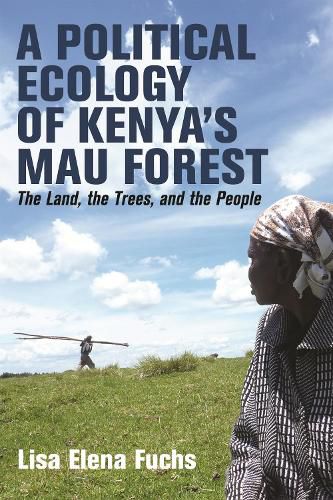Readings Newsletter
Become a Readings Member to make your shopping experience even easier.
Sign in or sign up for free!
You’re not far away from qualifying for FREE standard shipping within Australia
You’ve qualified for FREE standard shipping within Australia
The cart is loading…






The Eastern Mau Forest, part of the most important closed-canopy forest in East Africa, has come under severe threat since the 1990s. In this political ecology Lisa Fuchs exploring the failure of the government-led forest restoration and rehabilitation initiative to ‘Save the Mau’, launched in 2009, the author examines two of the most contentious issues in Kenya since colonial times: land and the environment. She sheds light on the structural factors and the role of individuals in the forest’s destruction and of non-protection and traces the colonial legacy of post-independent environmental conservation policies and practices. In doing so, Fuchs demonstrates that the Mau crisis is more than an environmental crisis: it is also a political, an economic, and a socio-cultural crisis. Though a detailed empirical analysis, the author shows that the ‘Mau crisis’ led to the near collapse of landscapes and livelihoods in the Mau Forest ecosystem. She traces the implementation of insufficient conservation programmes, which resulted from historical path-dependency and the adoption of global environmental governance blueprints, forest allocation and benefits, and exposes a forest management system that prioritises commercial forest production over biodiversity conservation. Access and entitlements to the highly fertile forest land, and the amalgamation of forest rehabilitation with the reclamation of grabbed public forest are emphasised as a further core contributor to the crisis. The socio-cultural dynamics within and among various forest-dwelling communities, including the indigenous hunting and gathering Ogiek and ‘in-migrant’ groups, are also analysed. The book highlights that local types of environmentalism are trapped between the ‘invention of traditions’ and ‘perverse modernisation’ and shows the contradictory effects of the celebrated, highly anticipated but poorly executed ‘Save the Mau’ initiative, and how the presence of political will to maintain the crisis conditioned its perseverance. Finally, the book proposes realistic alternatives to sustainable forest management in politicised environments, whose relevance and applicability are considerable in this age of anthropogenic ‘environmental’ crises and conflicts.
Published in association with IFRA/AFRICAE
$9.00 standard shipping within Australia
FREE standard shipping within Australia for orders over $100.00
Express & International shipping calculated at checkout
The Eastern Mau Forest, part of the most important closed-canopy forest in East Africa, has come under severe threat since the 1990s. In this political ecology Lisa Fuchs exploring the failure of the government-led forest restoration and rehabilitation initiative to ‘Save the Mau’, launched in 2009, the author examines two of the most contentious issues in Kenya since colonial times: land and the environment. She sheds light on the structural factors and the role of individuals in the forest’s destruction and of non-protection and traces the colonial legacy of post-independent environmental conservation policies and practices. In doing so, Fuchs demonstrates that the Mau crisis is more than an environmental crisis: it is also a political, an economic, and a socio-cultural crisis. Though a detailed empirical analysis, the author shows that the ‘Mau crisis’ led to the near collapse of landscapes and livelihoods in the Mau Forest ecosystem. She traces the implementation of insufficient conservation programmes, which resulted from historical path-dependency and the adoption of global environmental governance blueprints, forest allocation and benefits, and exposes a forest management system that prioritises commercial forest production over biodiversity conservation. Access and entitlements to the highly fertile forest land, and the amalgamation of forest rehabilitation with the reclamation of grabbed public forest are emphasised as a further core contributor to the crisis. The socio-cultural dynamics within and among various forest-dwelling communities, including the indigenous hunting and gathering Ogiek and ‘in-migrant’ groups, are also analysed. The book highlights that local types of environmentalism are trapped between the ‘invention of traditions’ and ‘perverse modernisation’ and shows the contradictory effects of the celebrated, highly anticipated but poorly executed ‘Save the Mau’ initiative, and how the presence of political will to maintain the crisis conditioned its perseverance. Finally, the book proposes realistic alternatives to sustainable forest management in politicised environments, whose relevance and applicability are considerable in this age of anthropogenic ‘environmental’ crises and conflicts.
Published in association with IFRA/AFRICAE